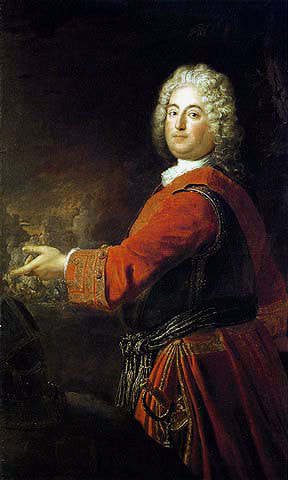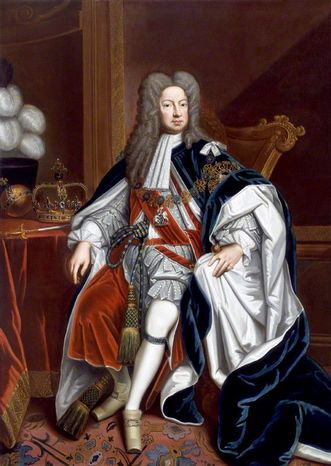Transports of Delight
|
Christian Ludwig Hohenzollern (1677-1734) , Margrave of Brandenburg-Schwedt, if he were alive to-day would probably have aka Elector of Brandenburg inscribed in his passport; this would ensure him endless delay at almost any airport. He used both styles - Margrave as a German prince and Elector as a member of the college that elected the Holy Roman Emperor. Even more equivocal would have been the position of his cousin, George Louis (1660- 1714), who combined the three titles of (lay) Bishop of Osnabruck, Elector of Hanover and, in course of time, King of England. Beside the enjoyment of multiple identities, they share the distinction of each being the dedicatee of an outstanding example of the music of their baroque period. JS Bach sent the manuscript of what we now call the Brandenburg Concertos to Christian Ludwig in the hope of obtaining employment at his Court. In common with the many CVs sent "on spec" to potential employers to-day, this produced no result. The pieces were unacknowledged, unperformed and, it seems, thrust into a drawer and forgotten. At least they weren't used to light the fire.
|
|
The Holy Roman Empire, of which the Royal cousins were Electors, was a confederation of indepedent central European states dating from the tenth century AD. Its structure, purposes and nature changed over the centuries: some aspects seem unclear even to specialists. What is certain is that by the time of Bach and Handel, it was well-past its apogee.
Handel had been a member of the Hanoverian court of George Louis. He obtained permission to visit London . . . and he decided to stay there. It was somewhat disconcerting when, some time later, the Elector of Hanover became King of England. People who have left one employer for another, only to return, unwillingly, to the first as result of a takeover will know exactly how GFH must have felt. Some bridge-building seemed necessary. This took the form of the Water Music Suites, which were performed as the King made progress along the Thames in the Royal Barge and seem to have achieved their objective. That, at least, is the story. |
Teachers of European History had one joke: The Holy Roman Empire was neither holy nor Roman; nor was it an empire. A pretty poor jest that evoked only the mildest of titters from the most sycophantic students, it illustrates, perhaps, the bleak nature of the lives of these unhappy academics. The study of European history makes it hard to remain cheerful, especially when your only joke is outshone by that of teachers of classical languages.
These latter wits of the classroom were accustomed to discuss Caesar with reference to the phrase Caesar adsum jam forte (Caesar, I have come quickly). This, they pointed out, could be read as Caesar had some jam for tea. A much better joke than the Holy Roman Empire effort, it wore well for about a century, being incorporated into school stories, anthologies of wit and humour and other widely-read publications. Then over-exposure had the inevitable effect. Groans rather than laughter began to greet its appearance in the classroom and surveys by leading academics showed that classicists were losing out to historians on the wit-rating index. Desperation set in.
The position was saved, improbably, by the Ford Motor Company which introduced a new range of light commercial vehicles, thus prompting a brand-new joke. Sic transit gloria mundi (thus pass all the glories of the world) could be presented as meaning "Gloria was sick in the van on Monday". Those with a holistic view of education would add that the indisposition probably resulted from Gloria's having had too much jam at tea-time on Sunday. With or without this qualification, the joke save the day and classics' reputation was secure. Unfairly, teachers in the United States were the last to benefit as introduction of the Transit range in the Americas was delayed.
Every student knows that, whatever official rankings may say, music teachers are the most amusing of all. Apart from having the most jovial of natures, they also enjoy endless supplies of what may be regarded as the raw material of humour. Haydn's music is full of jokes - perhaps the Surprise Symphony is the best-known of these, and even JS Bach unbent occasionally. Gerard Hoffnung, Tom Lehrer, John Amis and Ian Wallace, amongst others, brought endless flights of imagination to musical humour, many of which are available on CD. And no music library is complete without a copy of Jenny Setchell's "Organ-isms" and more recently, "Organs and Organists: Their Inside Stories".
Let's hear peals of merry laughter ringing from music rooms everywhere!
The position was saved, improbably, by the Ford Motor Company which introduced a new range of light commercial vehicles, thus prompting a brand-new joke. Sic transit gloria mundi (thus pass all the glories of the world) could be presented as meaning "Gloria was sick in the van on Monday". Those with a holistic view of education would add that the indisposition probably resulted from Gloria's having had too much jam at tea-time on Sunday. With or without this qualification, the joke save the day and classics' reputation was secure. Unfairly, teachers in the United States were the last to benefit as introduction of the Transit range in the Americas was delayed.
Every student knows that, whatever official rankings may say, music teachers are the most amusing of all. Apart from having the most jovial of natures, they also enjoy endless supplies of what may be regarded as the raw material of humour. Haydn's music is full of jokes - perhaps the Surprise Symphony is the best-known of these, and even JS Bach unbent occasionally. Gerard Hoffnung, Tom Lehrer, John Amis and Ian Wallace, amongst others, brought endless flights of imagination to musical humour, many of which are available on CD. And no music library is complete without a copy of Jenny Setchell's "Organ-isms" and more recently, "Organs and Organists: Their Inside Stories".
Let's hear peals of merry laughter ringing from music rooms everywhere!
David Bridgeman-Sutton,
(Originally written in 2013, and appearing now for the first time November 2017)
(Originally written in 2013, and appearing now for the first time November 2017)
Picture credits:
Picture 1: Christian Ludwig, Elector of Brandenburg, portrait by Antoine Pesne.
(whereabouts - if still extant - unknown), from Wikipedia under creative commons licence.
Picture 2
King George I , Elector of Hanover, studio of Sir Godfrey Kneller, Bt oil on canvas, (1714)
© National Portrait Gallery, London.
Picture 1: Christian Ludwig, Elector of Brandenburg, portrait by Antoine Pesne.
(whereabouts - if still extant - unknown), from Wikipedia under creative commons licence.
Picture 2
King George I , Elector of Hanover, studio of Sir Godfrey Kneller, Bt oil on canvas, (1714)
© National Portrait Gallery, London.



